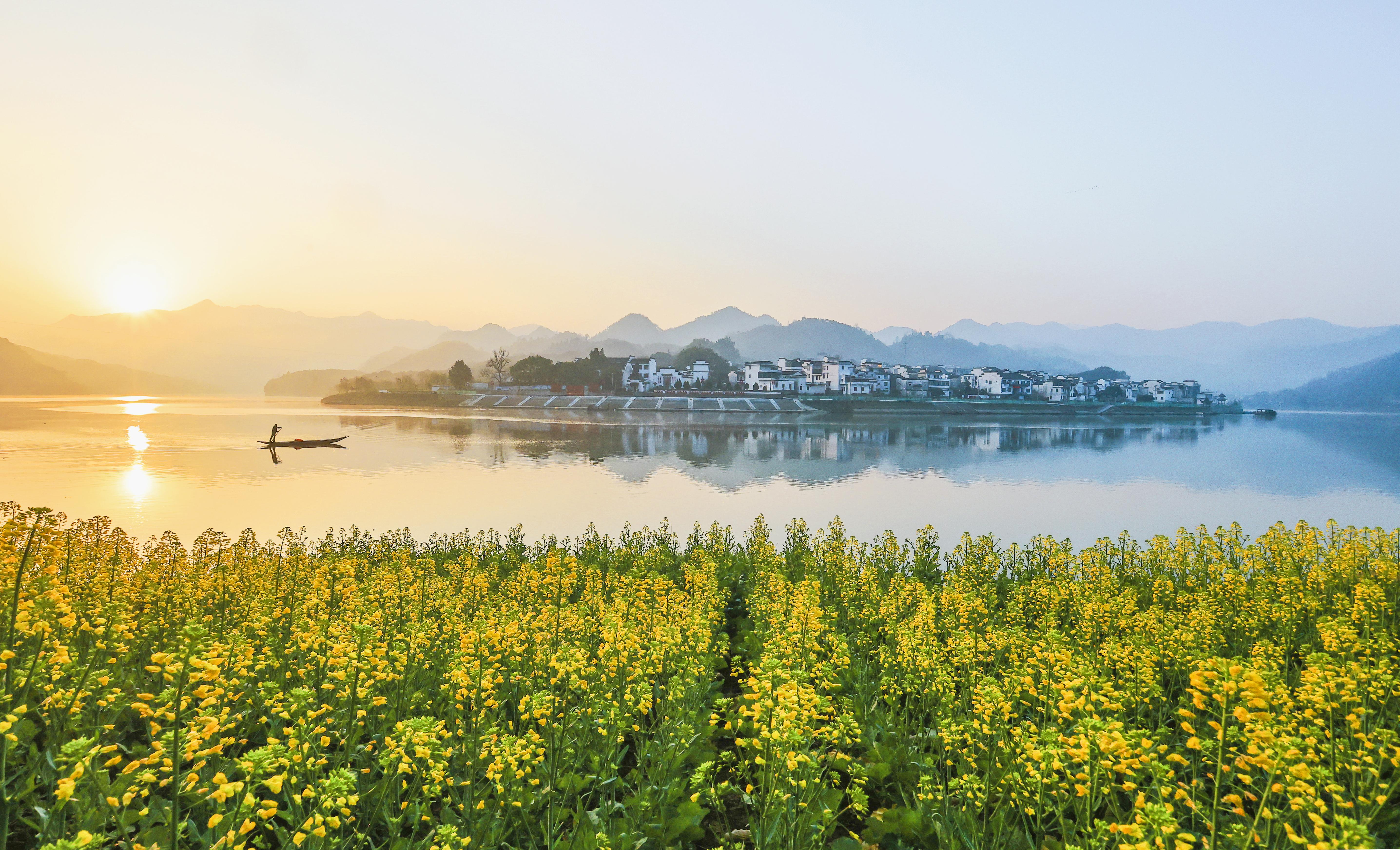
In March, rape flowers are blooming along the Xin'an River in Shexian county, Huangshan city. These flourishing flowers and ancient Hui-style villages have combined to create a watercolor landscape painting. (Photo/Zheng Hong)
Ancient people in Anhui created poems to describe what they saw and heard around them, express their feelings, and look forward to the future. Through those remarkable verses, today’s people can have a glimpse of the social, economic and cultural development of Anhui at that time, and also better inherit the excellent cultural heritage belonging to Anhui people.
Ancient poems bloom throughout Anhui
Anhui is a famous province of ancient poetry. According to incomplete statistics, more than 1220 ancient poets, such as Li Bai, Wang Wei, Du Fu, Bai Juyi, and He Zhizhang, came to Anhui or once lived in Anhui and wrote about Anhui. Almost every county and city in Anhui was left with ancient poetry. From northern Anhui like Dangshan area to southern Anhui like Huangshan area, substantial ancient poems still survived, although the only existing copies of some poems were destroyed due to wars and disasters.
Looking toward the province, there are more ancient poems describing southern Anhui than northern Anhui. The number of ancient poems depicting central Anhui like Hefei area remains huge. According to incomplete statistics, over 800 ancient poems were written specifically about Chaohu Lake from the pre-Qin period (before 221 BC) to the Qing Dynasty (1616-1911). These works are realistic, concise, inspirational, short and informative.
Different environments always give various characteristics to its poems
Regional culture always nurtures ancient poems. The unique features of a local environment always give special characteristics to its residents and poems.

The Lake of Peach Blossom (Photo/Wen Qin)
In 747, Li Bai left Jinling for Dangtu in Anhui Province. When entering the Dabie Mountains, the poet was fascinated by the scenery there. In Xuancheng, he wrote “All birds have flown away, so high. A lonely cloud drifts on, so free. Gazing on Mount Jingting, nor I am tired of him, nor he of me.” When Wang Lun invited him to the peach blossom lake, the poet wrote “The Lake of Peach Blossom is a thousand fathoms deep, but not so deep as the friendship Wang Lun and I keep.” Li Bai traveled all over Anhui and created more than 200 poems specifically about Anhui, accounting for about a quarter of his total works, which showed the attraction of this land for him.

Li Bai spent his twilight years in Caishiji, Dangtu county. (Photo/Li Chenglin)
Bai Juyi whose hometown is Taiyuan in Shanxi province, went to many places with his father and settled down in Suzhou in Anhui province when he was young. “Wild grasses spread over ancient plain; With spring and fall they come and go. Fire tries to burn them up in vain; They rise again when spring winds blow.” These lines through the ages were composed just in Suzhou. Among 3800 odd poems he created in his life, more than 50 ones were written about Fuliji in Suzhou alone.
When it comes to the "Tongcheng School" in Anhui, its representative writers include Fang Bao, Liu Dakui and Yao Nai, who are all natives of Tongcheng County in Anhui Province, and they promoted the literature of Anhui to the whole country. A narrative poem "The Peacock Flies Southeast" with a background in Anhui and a total of 353 sentences and 1765 characters, has become the peak of Chinese Yuefu poetry.
Follow the poetry road to the distant land
In recent years, most ancient poems selected into the textbooks are from Li Bai, Du Fu, Bai Juyi, Wang Wei and Du Mu, whose poems describing Anhui take up a large part of their works. The theme of poetry in selected textbooks basically can be divided into the love for nature, reflection of people's suffering, and the relations with friends and relatives, etc. It shows that those ancient poems still mirror the spirit advocated today.
The ancient poetry is vivid, emotional and concrete. Most poets chose a perspective of common people and composed poems based on the real life of ordinary people at that time, which is complementary to the official history focused on the records of emperors and generals. Through the study of the ancient poetry of Anhui, you will meet the most beautiful scenery of Anhui.












